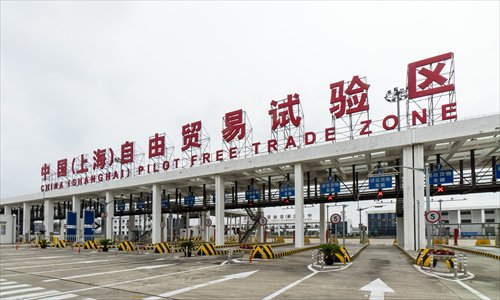Negative list will boost market vitality: experts
System to be applied nationwide from 2018

An entrance to the China (Shanghai) Pilot Free Trade Zone Photo: CFP
China will roll out a negative list approach for both domestic and foreign investors across the country in a few years, which will allow investors more freedom and help boost market vitality, experts said on Tuesday.
The system is currently used in just a few specific areas but will be implemented nationwide in 2018, the Xinhua News Agency reported on Monday.
In the three years prior to 2018, the central government will launch pilot programs for the negative list system in "certain areas" in the country, in a bid to "gain experience" and "gradually improve the list," Xinhua reported.
Also, guidelines for the negative list approach were approved during a government meeting on September 15, according to the report.
The move will be significant in giving the market a decisive role in allocating resources, building a law-based business environment and setting up a more open economic system, according to the guidelines.
The guidelines also said that the government should loosen controls on powers that should be given to the companies, and give freer rein to the market.
The key aspect of a negative list is that all sectors are open to investors apart from those detailed on the list. The system is widely used internationally for the administration of investment, particularly from foreign investors.
A staff member with the China (Shanghai) Pilot Free Trade Zone (FTZ) management committee, who wished to remain anonymous, told the Global Times on Tuesday that the market access standards would be "almost the same" for overseas and domestic investors under the 2018 negative list.
But unlike the existing negative list in the Shanghai FTZ, which was mainly designed for foreign investors, the 2018 negative list will be "primarily" for domestic investors, Tu Xinquan, an expert at the China Institute for WTO Studies at the University of International Business and Economics, was quoted as saying on Tuesday by the China Business News.
But Ding Yifan, deputy director of the Institute of World Development at the Development Research Center of the State Council, said that there should be some difference between the options available for domestic and foreign investors.
"Some areas, like national security, could be open to domestic investors, but not to foreign capital," Ding told the Global Times on Tuesday.
Wang Yukai, a professor with the Chinese Academy of Governance, was also quoted by the China Business News as suggesting that the negative list should allow greater flexibility for domestic investors than for overseas investors, in order to stimulate market vitality.
China first introduced a negative list system for foreign investment in the Shanghai FTZ, which was launched in September 2013.
In December 2014, the central government announced that the three new FTZs in South China's Guangdong Province, North China's Tianjin and East China's Fujian Province would also have the same negative list adopted by the Shanghai FTZ.
Luo Yuding, acting dean of the College of Business at the Shanghai University of Finance and Economics, told the Global Times on Tuesday that the negative list is beneficial for foreign investors as it helps them to understand the Chinese government's policy on foreign investment.
According to the China Business News report, the proportion of foreign enterprises in the Shanghai FTZ has grown from 5 percent when the zone was first set up to about 18 percent at present.
Luo said the fact that the Chinese government has reduced the number of items on the negative list several times in recent years has also brought benefits for foreign investors.
The negative list for the Shanghai FTZ was cut from 190 special regulatory measures in 2013 to 139 in 2014, and further to 122 in 2015.
Both Luo and Ding said the number of items on the negative list should be even lower in future.
Ding also pointed out that there are some ambiguous details in the current negative list that have reduced its helpfulness to foreign investors and that need further clarification.